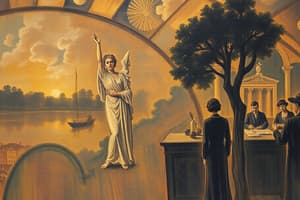Podcast
Questions and Answers
What is a key characteristic of Transaction Processing Systems (TPS)?
What is a key characteristic of Transaction Processing Systems (TPS)?
- They provide continuous real-time data collection. (correct)
- They require manual intervention for data processing.
- They operate successfully with low volumes of data.
- They only operate in offline modes.
Which of the following is NOT typically a feature of a Transaction Processing System?
Which of the following is NOT typically a feature of a Transaction Processing System?
- Batch processing capabilities.
- Online Transaction Processing (OLTP).
- Source data automation.
- Less emphasis on data security. (correct)
What is one primary purpose of an Enterprise Resource Planning (ERP) system?
What is one primary purpose of an Enterprise Resource Planning (ERP) system?
- To enhance data redundancy across departments.
- To focus exclusively on financial transactions.
- To integrate and manage core business processes. (correct)
- To limit communication between subsidiaries.
How might implementing an ERP system be disadvantageous for a business?
How might implementing an ERP system be disadvantageous for a business?
What are the three main business processes supported by ERP systems?
What are the three main business processes supported by ERP systems?
Why is compatibility of Information Systems important for companies with subsidiaries?
Why is compatibility of Information Systems important for companies with subsidiaries?
What role do consultants play in the implementation of Information Systems?
What role do consultants play in the implementation of Information Systems?
Which of the following is NOT a characteristic of a Functional Area Information System (FAIS)?
Which of the following is NOT a characteristic of a Functional Area Information System (FAIS)?
Which aspect of Transaction Processing Systems helps maintain data security?
Which aspect of Transaction Processing Systems helps maintain data security?
Which type of report is specifically designed to highlight exceptions or deviations from expected norms?
Which type of report is specifically designed to highlight exceptions or deviations from expected norms?
What are the primary components of Enterprise Resource Planning (ERP) systems?
What are the primary components of Enterprise Resource Planning (ERP) systems?
Which of the following best describes the purpose of drilling down in a report?
Which of the following best describes the purpose of drilling down in a report?
Three Square Markets' case study highlights the use of what technology within employees?
Three Square Markets' case study highlights the use of what technology within employees?
What is the primary benefit of using an Enterprise Application Integration (EAI) strategy?
What is the primary benefit of using an Enterprise Application Integration (EAI) strategy?
Which of the following report types is generated in response to specific requests?
Which of the following report types is generated in response to specific requests?
What distinguishes ERP II systems from traditional ERP systems?
What distinguishes ERP II systems from traditional ERP systems?
What is a primary characteristic of the vanilla approach in on-premise ERP implementation?
What is a primary characteristic of the vanilla approach in on-premise ERP implementation?
Which of the following is NOT a major advantage of using a cloud-based ERP system?
Which of the following is NOT a major advantage of using a cloud-based ERP system?
Which statement best describes a disadvantage of adopting cloud-based ERP systems?
Which statement best describes a disadvantage of adopting cloud-based ERP systems?
In the context of ERP, what does the term 'core ERP modules' refer to?
In the context of ERP, what does the term 'core ERP modules' refer to?
What is the primary objective of the procurement process in ERP systems?
What is the primary objective of the procurement process in ERP systems?
Which of the following best describes extended ERP modules?
Which of the following best describes extended ERP modules?
Which approach to ERP implementation focuses on integrated solutions from various vendors?
Which approach to ERP implementation focuses on integrated solutions from various vendors?
What is a common misconception regarding the security of cloud-based ERP systems?
What is a common misconception regarding the security of cloud-based ERP systems?
Flashcards are hidden until you start studying
Study Notes
Learning Objectives
- Understand transaction processing systems and their purpose
- Recognize types of information systems for various organizational functions
- Assess advantages and drawbacks of implementing enterprise resource planning (ERP) systems
- Identify main business processes supported by ERP systems
Chapter Outline
- Transaction Processing Systems (TPS)
- Functional Area Information Systems (FAIS)
- Enterprise Resource Planning (ERP) Systems
- ERP Support for Business Processes
Transaction Processing Systems (TPS)
- TPS involves the automation of transaction data collection and efficient processing of high volumes of data.
- Online Transaction Processing (OLTP) allows immediate data entry and retrieval.
- Batch processing handles data in large volumes at intervals.
- Key characteristics include real-time data collection, accuracy, security, and minimal downtime.
Functional Area Information Systems
- FAIS support various departments in an organization:
- Human Resource Management: Recruitment, payroll, benefits administration, and employee relationship management.
Reporting Systems
- Various report types serve different needs:
- Routine Reports: Regularly scheduled.
- Ad-hoc Reports: Generated on demand, including:
- Drill-down reports for detailed insights
- Key indicator reports for performance measurement
- Comparative reports for benchmarking
- Exception reports to highlight unusual conditions
Enterprise Resource Planning (ERP) Systems
- ERP systems integrate business processes across various functions to streamline operations.
- Different approaches for implementing ERP:
- On-premise ERP: Can be based on vanilla (standard), custom, or best-of-breed solutions.
- Software-as-a-Service (SaaS): Cloud-based delivery model.
Benefits of Cloud-based ERP Systems
- Accessible from any location with internet connectivity.
- Reduces initial hardware and software costs associated with on-premise systems.
- Scalable to accommodate new business processes and partnerships.
Drawbacks of Cloud-based ERP Systems
- Security concerns regarding data protection in cloud environments.
- Reduced control over strategic IT resources.
- Potential issues with IT management during system failures.
ERP Support for Business Processes
- ERP systems facilitate key processes:
- Procurement Process: Acquisition of goods and services.
- Fulfillment Process: Delivery of products to customers.
- Production Process: Management of manufacturing operations.
Capstone Mining Case
- Capstone Mining's ERP implementation led to enhanced operational efficiency, illustrating the advantages of consistent IS across subsidiaries.
- Importance of IS compatibility for subsidiaries and the role of consultants in supporting implementation.
Elbow Partner Discussions
- Discuss characteristics of FAIS and compare the three basic types of reports.
- Define ERP and ERP II, focusing on their functions and modules.
Studying That Suits You
Use AI to generate personalized quizzes and flashcards to suit your learning preferences.




